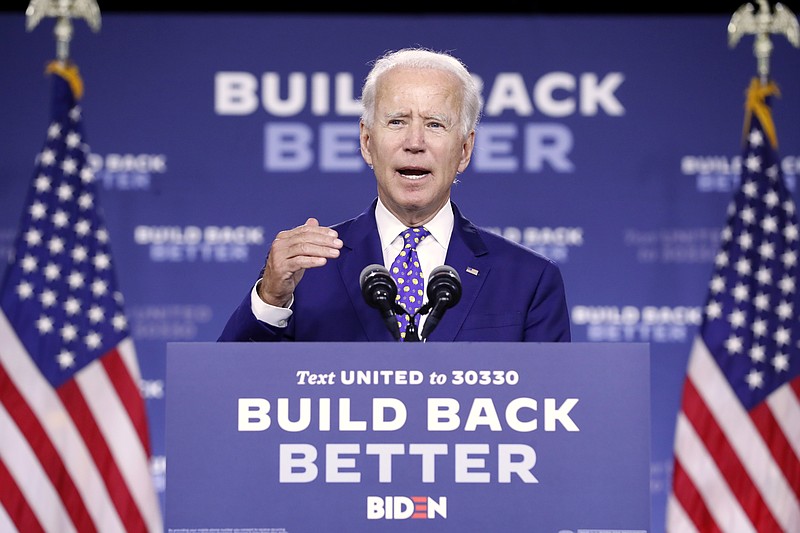It took some time - maybe too much time - but Joe Biden finally put forward an energy and climate plan that has some bite, both for the earth and for rebuilding the U.S. economy.
The plan also has some distinctive detractors - the usual suspects, the oil lobby and Republican leadership - proving that it is indeed a worthwhile plan. After all, the oil lobby and our current Republican leaders never met a drop of oil and coal pollution they couldn't love.
In mid-July, Biden unveiled a $2 trillion plan to slow climate change and fight environmental racism. With his announcement, the 77-year-old former vice president told a group of voters young enough to be his grandchildren that he heard and understood their passion about climate change.
"I want young climate activists, young people everywhere, to know: I see you. I hear you. I understand the urgency, and together we can get this done," he said.
Biden is calling for 100% clean electricity by 2035. That means the elimination of carbon pollution from the electric sector in 15 years - a big improvement over his first plan released about three months earlier. That one was lukewarm - a $1.7 trillion plan aimed at making the nation carbon neutral by 2050 - 30 years from now.
But we don't have 30 years to make a difference, and 15 is pushing the limits. We've already wasted four years, and we cannot afford to waste any more. Biden gets that now. And his new plan shows it.
* He pledges to rejoin the international Paris climate accord and reverse 100 of Donald Trump's public health and environmental rollbacks.
* He plans to spend $2 trillion over four years to boost renewables and create incentives for more energy-efficient cars, homes and commercial buildings. We're talking upgrades for four million buildings and weatherization for two million homes over four years. The Biden campaign estimates that alone would create one million jobs.
* He would expand solar and wind energy, including the installation of 500 million solar panels and 60,000 wind turbines. That's more jobs.
* He would call for American-built buses to emit zero greenhouse gases by 2030 (why not? Chattanooga has had electric buses for years), and he would convert the country's 500,000 school buses, including those running on diesel fuel, to zero emissions. He also would build 500,000 electric vehicle charging stations. Jobs.
* He's calling for the creation of a "civilian climate corps," an idea that was promoted during the Democratic primary by Gov. Jay Inslee, D-Washington, whose campaign focused almost entirely on climate change. The proposed CCC is modeled after the Civilian Conservation Corps established by President Franklin Delano Roosevelt during the Great Depression in another economic program based on infrastructure designed to pull our nation from a dire economic slump.
This is real infrastructure, folks. Real infrastructure and jobs-building - not another fake Trump "Infrastructure Week" designed only to divert attention from the newest White House scandal.
Homeowners also would be given cash rebates to upgrade home appliances and install more efficient windows. Car owners would receive rebates to swap their old, less efficient cars for newer ones that release fewer pollutants.
Biden put the extra work into this energy/climate/economy plan after getting the "urgency" message from the youth-led Sunrise Movement. The group gave his first plan an "F" rating and said it lacked detail and paled in comparison to the aggressive action proposed by his early primary rivals Sen. Bernie Sanders and Sen. Elizabeth Warren who backed the Green New Deal.
So the Biden campaign invited ideas from the young climate crusaders, union officials, environmental justice leaders and those former Democratic rivals. The new plan is the result of that three-month outreach, according to The Washington Post.
The reset worked. "We've seen a pretty huge transformation in Biden's climate plan," Varshini Prakash, co-founder and executive director of the Sunrise Movement, told The Post. Now the group, which claims more than 10,000 members, will campaign for Biden, she said.
The new plan also doesn't waste time or energy on any kind of Obama-like cap-and-trade system in which companies buy and sell credits permitting them to release carbon into the atmosphere. That's a good thing, since cap-and-trade plans are almost as toxic in politics as they are for the earth.
Instead, Biden puts the onus on utility companies, something that's already been tested successfully at the state level. A majority of states - including several conservative ones such as Montana, Iowa and Texas - have imposed their own renewable energy requirements on local utilities. But no standard exists at the federal level. Biden would create one.
"This is the single most comprehensive and ambitious climate plan ever advanced by a major presidential nominee," said Sam Ricketts, who co-authored Inslee's climate plan.
As we said earlier, it's overdue. The majority of the public is very much in the mood for this kind of action. Nearly two-thirds of Americans say the federal government should act more aggressively against climate change, according to a May poll from the Pew Research Center. The same poll found that 60% of the American public now views climate change as a "major" threat - up from 44% about a decade ago.
